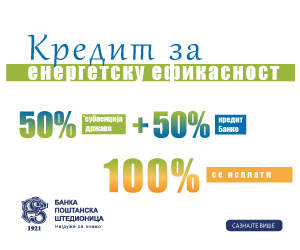
Blog: NUNS Centar za istraživačko novinarstvo - CINS, 04.Sep.2010, 03:21 (ažurirano 02.Apr.2020.)
Prime Minister And Fugitive Shared Business
Balkan ties and bankruptcy trustees
Serbian Prime Minister Mirko Cvetković and an Interpol fugitive facing 10 years in a Macedonian prison formed a business partnership while Cvetković was serving as finance minister that was not dissolved until after he assumed the higher office in 2008.
http://www.reportingproject.net/occrp/index.php/ccwatch/cc-watch-briefs/786-prime-minister-and-fugitive-shared-business
By Djordje Padejski
Documents obtained by the Center >> Pročitaj celu vest na sajtu Blogovi << for Investigative Reporting in Serbia (CINS) show that Cvetković and Macedonian businessman Vladislav Tamburkovski, 36, founded and ran the Belgrade company BRG for almost four years, dissolving it in October, 2008. The records contradict the prime minister’s Spokesman Danijel Apostolović, who said the partnership ended years before he came into power. Apostolović also said Cvetković didn’t know his partner was a wanted man until informed by CINS.
Cvetković and Tamburkovski share a history that dates to 2005 when both worked for Ces Mecon, a consulting firm for the Privatization Agency of the Republic of Serbia. Ces Mecon received nearly €6 million in contracts from the state, including about €2.8 million while Cvetković held dual roles in 2003 and 2004 as executive director at the company and managing director of the privatization agency.
In 2006 Tamburkovski was charged and eventually sentenced in Macedonia to more than 10 years in prison after investigators found he misused his position as bankruptcy trustee in four cases, costing the state more than €500,000. According to the Macedonian indictment, Tamburkovski illegally sold off parts of companies he was entrusted to guide through the bankruptcy.
Representatives of Cvetković initially refused to comment on the story, but offered a response after CINS published the information on its website. Apostolović then said that in the past four years Cvetković has not had any contact with Tamburkovski. Therefore, Apostolović said, it can’t be true that they worked together as Cvetković came into office.
Documents show that in 2005, Cvetković, Tamburkovski and Professor Stipe Lovreta, now working as an adviser to the government, founded a private consulting firm called BRG d.o.o. The company was registered at Kralja Milana 34 in Belgrade, with founding capital of €500 Cvetković and Tamburkovski each had a quarter share and Lovreta had half. That company was closed in October 2008. In 2007, when Cvetković was named minister of finance, he said he had transferred his managing rights to a non-related person. But corporate records reviewed by CINS make no mention of him transferring power, but do reveal that Cvetković remained a shareholder of BRG until it closed three months after he became prime minister.
During the initial years of BRG, Tamburkovski was a director, but was dismissed from a leadership role in November 2007, after the Macedonian Courts began proceedings against him. He was subsequently found guilty of economic crimes. The prime minister’s office said Tamburkovski left the joint company in early 2007. However, records show that he actually remained one of the three owners until the company closed.
Co-founder Lovreta today works for the government of Serbia, as an advisor to Trade and Services Minister Slobodan Milosavljević. CINS could not reach Lovreta for this story.
Tamburkovski as bankruptcy trustee
Tamburkovski was a well-known economic consultant and lecturer in Macedonia, as well as a bankruptcy trustee in several Macedonian companies.
Cvetković’s spokesman said The World Bank recommended Tamburkovski to him as one of the best bankruptcy experts in the region. Records show that in March 2006 the first criminal charges for abuse of office were filed against him.
Tamburkovski fled and eventually prosecutors convicted him in absentia, said Ivo Kotevski, a spokesman of the Macedonian Ministry of Interior. Koteski said that in the first case, the court in Veles convicted Tamburkovski of abuse of office in his capacity of bankruptcy trustee for the smelter company Investas. According to the verdict, by illegally selling off assets he cost the company €390,000. The court in Skopje found him guilty of abuse of office in three other cases. A 2006 indictment said he illegally sold large quantities of lead, zinc, cadmium and silver from the bankrupt company Zletovo that he oversaw in 2003 and 2004.
Kotevski said that Tamburkovski has eluded Macedonian police since 2006, despite being placed on the Interpol wanted list. An Interpol Red Notice for Tamburkovski was issued Dec. 3, 2007. A dual citizen of Macedonian and Bulgaria, Tamburkovski is believed to be in Bulgaria which will not extradite citizens to Macedonia.
Although Tamburkovski never returned to face the allegations, he made statements to the media on several occasions that the charges against him were false and that he is a victim of politically motivated vendetta.
“All the witnesses and physical evidence that I had proposed were rejected by the judge and a fair defense was not made possible,” Tamburkovski told Macedonian A1 TV after proceedings were initiated in the smelter case in 2006.
What exactly was BRG?
According to the founding documents, the joint company BRG was called the “Belgrade Recovery Group”, but the name was changed to BRG because it was too similar to another company. Despite the existence of a mail-box with BRG’s name at Kralja Milana 34, CIN could not find anyone associated with the company at the address. The company was deleted from the active business registry on Oct. 15, 2008. The address in Belgrade is the same as a company called Mecon. Mecon, a public relations company, merged in 2006 with a company called Ces Mecon where Cvetković was an executive and Tamburkovski once worked.
Origins at Ces Mecon
Both Mecon and Ces Mecon are owned by Zvonimir Nikezić, a long standing associate of the prime minister. Court records show Cvetković served as executive director of Ces Mecon when Nikezić founded it in 1993. Nikezić’s son, Dušan Nikezić, is an adviser to Cvetković today and also worked for the companies.
Tamburkovski and Cvetković’s first known business relationship came in 2005 at Ces Mecon, where they worked on a €253,000 contract for the state Privatization Agency to consult on how the state should privatize bankrupt companies. The team leader on the project was Dušan Nikezić who earned a fee of €25,000. Tamburkovski earned €18,000 and Cvetković earned €12,000.
The Privatization Agency said it never employed Tamburkovski, but did hire Ces Mecon, his employer.
However, this was not the only contract in which Ces Mecon advised the Privatization Agency. Cvetković, between 2002 and 2004, was the director of the Privatization Agency while at the same time serving as executive director of Ces Mecon. According to a review of payments between 2002 and 2009, which the Privatization Agency released to CINS, Ces Mecon received the second highest amount of money from contracts over the previous eight years from consulting work - €5.7 mil. Only the consulting branch of Morgan Stanley earned higher fees, but all of its money came from a single project in 2003.
Warning from the Anti-Corruption Council
The Anti-Corruption Council in 2004 said there was clearly a conflict of interest in Cvetković’s dual roles in the Privatization Agency and Ces Mecon.
Verica Barać, president of the council, said the revelations about Cvetković’s dealings offer a dramatic example of how important matters of state are carried out as private businesses of consultancy houses.
“Certain teams of people leave consultancy jobs and go to work for to government agencies, while others remain in these firms, ending up jointly agreeing on projects and activities. They, of course, are never controlled, but it always seem to have a bad result for the country,” said Barać. Barać said there is no real audit but if there were, the public would be able to find out who really controls the companies.
Pošalji/Snimi
Nastavak na NUNS Centar za istraživačko novinarstvo - CINS...









